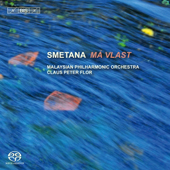
ESSENTIAL RECORDINGS

Upon your first audition of Má Vlast, a cycle of Symphonic Poems by
the Czech composer Bedrich Smetana (1824-1884), it would not be a stretch for
you to
accidentaly believe that you are listening to incidental music from an epic Wagner opera. Surprising
when you consider this statement by the composer himself in 1882; "I am, according to my
merits and according to my efforts a Czech composer, and the creator of the Czech style in the
branches of dramatic and symphonic music - exclusively Czech." But the opening pages of
Vysehrad (The High Castle), the first piece in the cycle, with its
ethereal harp, brass choir and nobility permeating every note, transport you into the dramatic world
of Tristan und Isolde. The evocative power of the music is tangible. Its depiction of an old castle,
overlooking the banks of a river in Prague, filled with a history recalling the glorious days of
Bohemian royalty, is as epic and pictoresque as any Wagnerian immolation. And conductor
Claus Peter Flor and the Malaysian Philharmonic Orchestra
members are all in on the story, and relate it to us with an unmatched level of stoicism, courage and
pathos.
Vltava (The Moldau), the second tone poem in the cycle, became so
popular that it is now often performed and recorded on its own as an orchestral showpiece. It depicts,
and very well so, the long journey of the Czech river from its origin as a small spring to its
culmination as a wide and vast seaway. The merging of two separate brooks into one stream at the
onset, accomplished by the gradual blend of two flutes and a clarinet, is magically captured in this
recording. The flow of the river at night under a starry sky, with its combination of harp, flutes, and
shimmering strings is also very well portrayed here. You can almost see the moon's reflection
glistening on the water. The turmoil of the rapids will toss you around, and the sense of joy when
reaching Prague, with its rapidly flowing and expanding waters drifting away in the distance will
capture your imagination in this vivid performance.
Another distinctive work in the cycle is the one titled From Bohemia's Woods and
Fields, a piece described by the composer himself as a musical portrayal of the
various emotions brought to the surface when traveling through the Czech countryside. From folk
dances to clouds rolling over wide open fields, everything is expertly thrown together and
manipulated to form a gripping portrayal of life.
The suite concludes with pieces more entrenched in the valiant history of the Czech people, from the
Medieval times to a glance into its bright future. The grandiose atmosphere and power of Vysehrad
make a dramatic comeback at the end that leads the way to an uplifting conclusion. At this point, the
audience was on its feet and crying "Smetana" over and over, during the inaugural performance in
1882. Unfortunately, the composer himself could not hear a note of the music or the applause,
because of his total deafness since 1874, caused by syphilis which killed him in 1884.
BIS have just added another excellent recording to their comprehensive and
sonically impressive catalogue. And as mentioned earlier, Claus Peter Flor and the Malaysian
Philharmonic Orchestra do it justice by bringing to the table a performance of this work that can
easily rival the iconic interpretations by such conductors as Ancerl and Kubelik, who
incidentally, was one of Flor's teachers.
Jean-Yves Duperron - January 2011